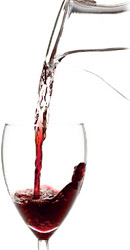 Hi,
Hi,
I have started with 32 lbs. of concord grapes, sorted and crushed. The recipe (doubled) on page 19 of your book named “Winemaker’s Recipe Handbook“, recipe #54, the Concord “Fresh -Dessert” one does not call for any water, where the other Concord choices of wine recipes do call for water.
As I have never made wine before that did not call for some water, what can I expect this wine to be like, dryish, or not, I am at a loss as to what to expect. Should I add some water?
Thanks
Kelly
———-
Hello Kelly,
Just to let you know, all the commercially made grape wines you see of the store shelf: Cabernet Sauvignon, Merlot, Chardonnay, Concord and hundreds of others, are made from 100% grape juice– no water added. The straight juice from these grapes are near optimal for making wine in terms of acidity, flavor intensity and sugar level. That’s why most wines are made from grapes.
But fruit wines such as raspberry, blackberry, plum, etc., all need to have their juice cut with water in their wine recipes. This is mainly because these juices have too much acid in them. This makes their flavor too sharp/sour for drinking. You can see some of these wine recipes on our website.
Using straight Concord grape juice when making a homemade grape wine will produce a full-bodied wine — rich in color with plenty of flavor. The other wine recipe with the water added, will make more of a blush wine, not as bold, more crisps in character.
It is important to note that one of theses wine recipes is not necessarily better than the other, they simply produce different styles of wine. Personal preference will dictate as to which one you think is best.
As to your question about the sweetness, either of these wine recipes can be made sweet or dry. How much water is, or isn’t, in these wine recipes does not factor into the sweetness. All the sugar in the wine must will be fermented into alcohol and the wine will by dry, regardless if water is used or not.
If you want your wine sweet it is just a matter of adding sugar at bottling time. It is also important to realize that if sugar is added you will also need to add potassium sorbate to stabilize the wine, otherwise a re-fermentation could occur.
Best Wishes,
Customer Service at E. C. Kraus
———————————————————————————————————
Ed Kraus is a 3rd generation home brewer/winemaker and has been an owner of E. C. Kraus since 1999. He has been helping individuals make better wine and beer for over 25 years.
